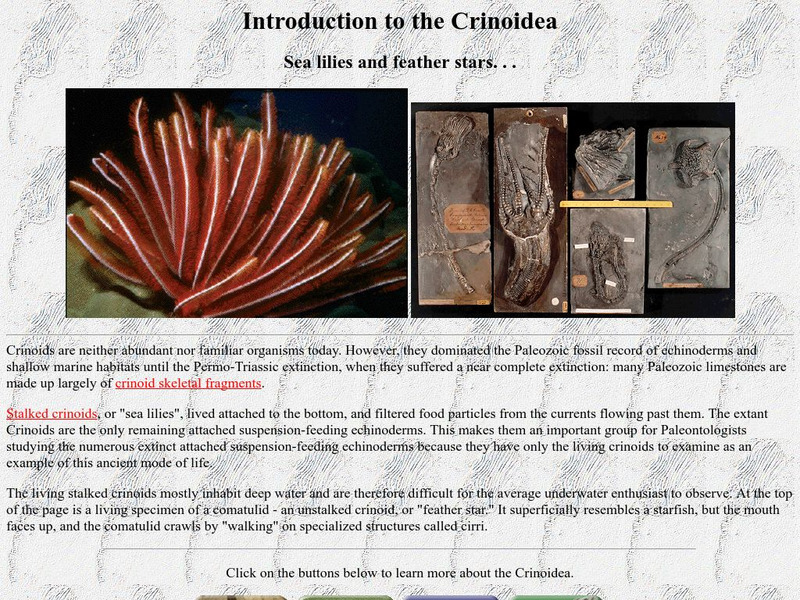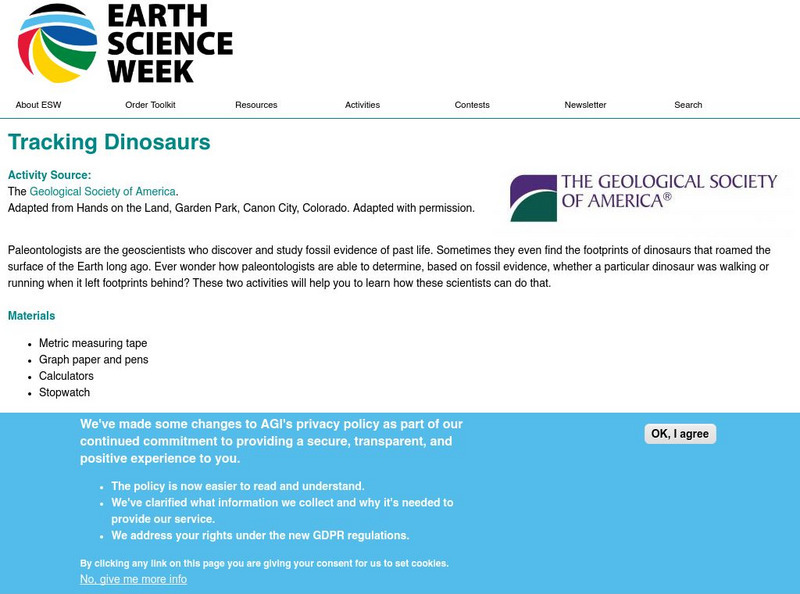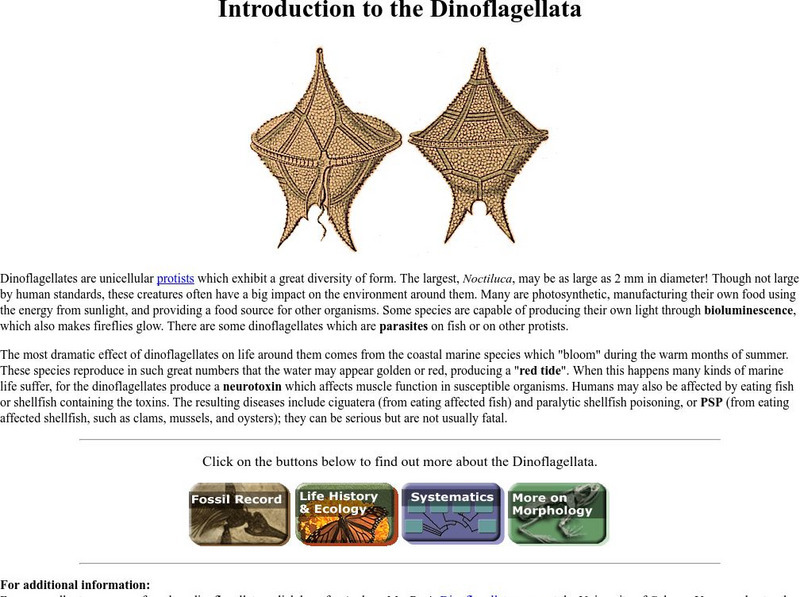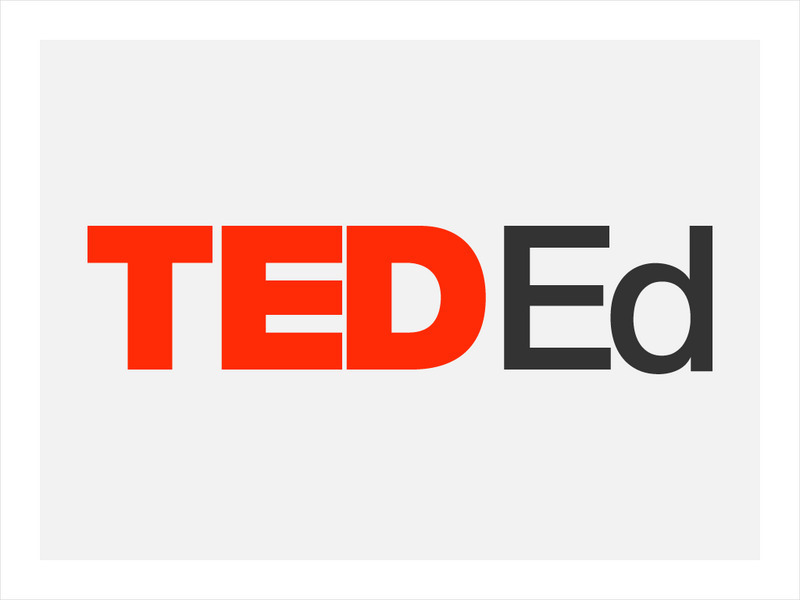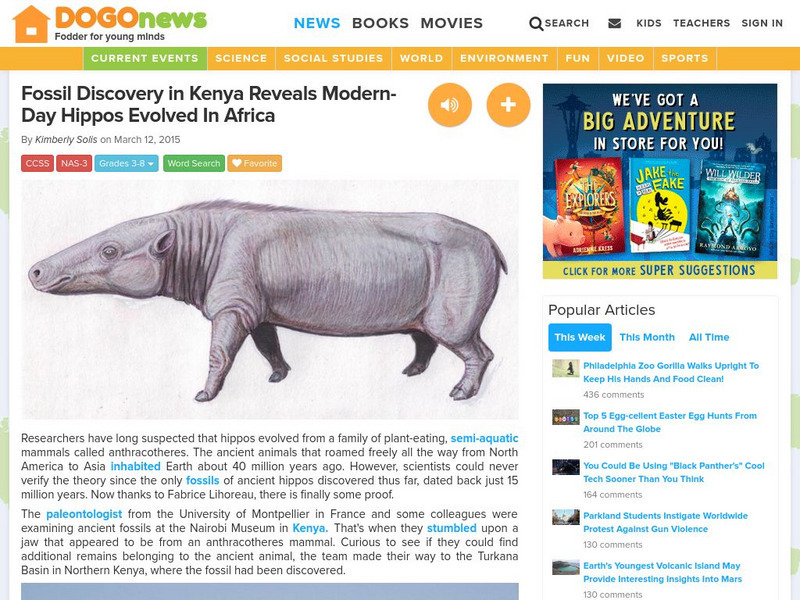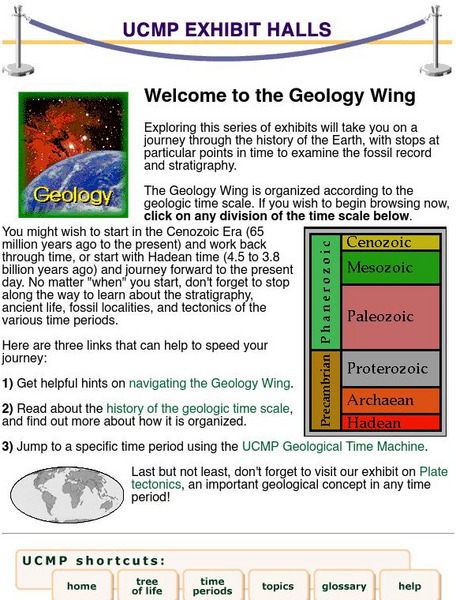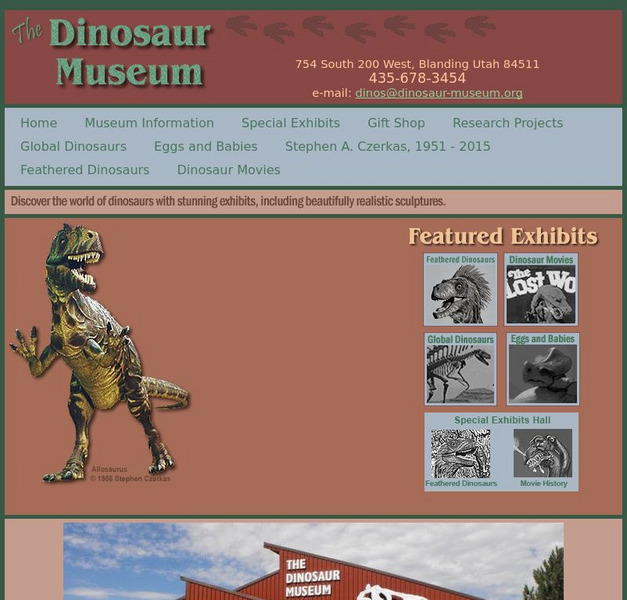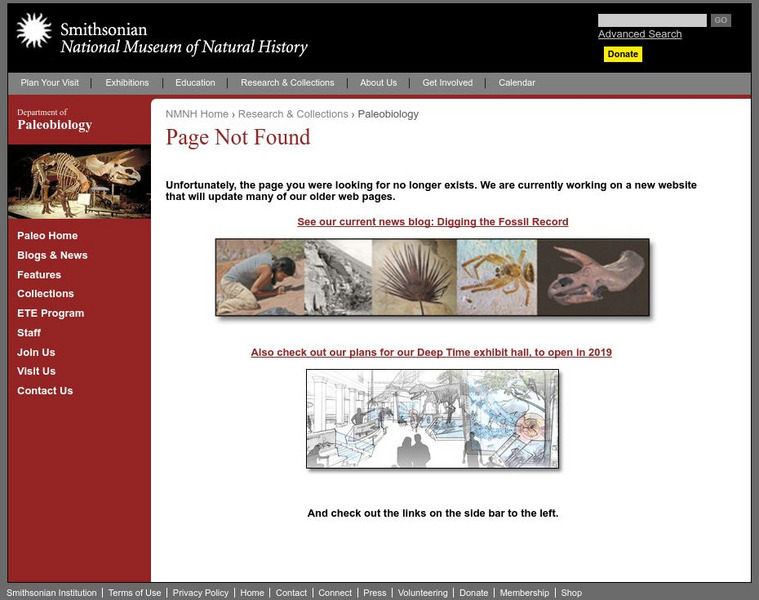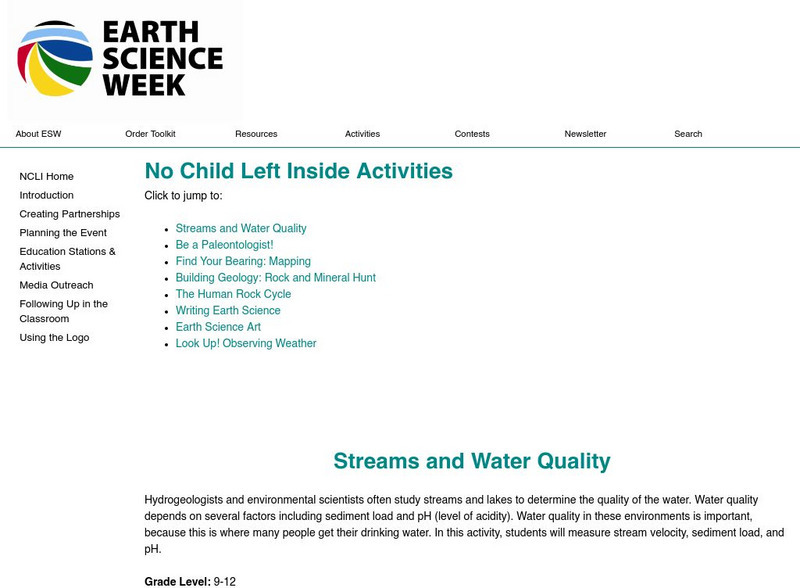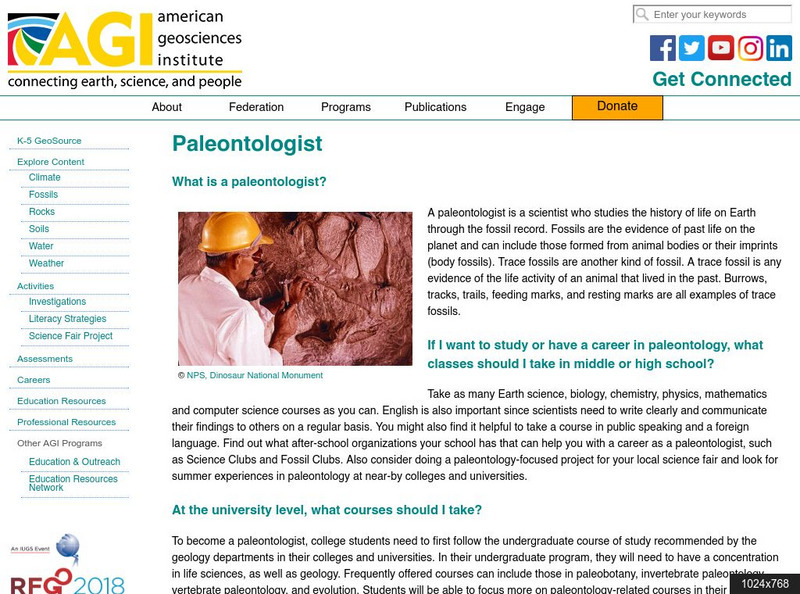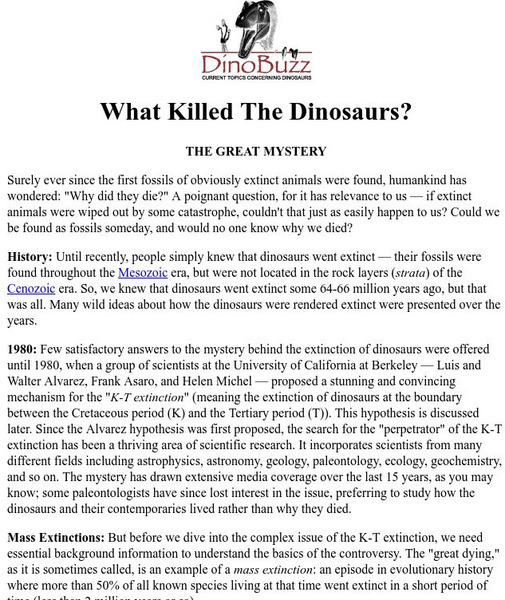Hi, what do you want to do?
University of California
Ucmp: Introducing Crinoids
This site from University of California is an introduction to crinoids with pictures. Click on another link to learn about the history and ecology, fossils, or morphology.
American Geosciences Institute
American Geosciences Institute: Earth Science Week: Tracking Dinosaurs
Two activities that will help students learn how paleontologists are able to determine, based on fossil evidence, whether a particular dinosaur was walking or running when it left footprints behind.
Discovery Education
Discovery Education: Dinosaur Detectives
For this lesson, young scholars conduct research on what paleontologists do when they study dinosaur fossils. They learn about some of the major paleontologists, what they discovered, and how opinions about fossils change over time as...
University of California
Ucmp: Dinoflagellates
The University of California provides background material on dinoflagellates which exhibit bioluminescence. Site includes information on their fossil record, ecology, and structure.
TED Talks
Ted: Ted Ed: Building a Dinosaur From a Chicken
Renowned paleontologist Jack Horner has spent his career trying to reconstruct a dinosaur. He's found fossils with extraordinarily well-preserved blood vessels and soft tissues, but never intact DNA. So, in a new approach, he's taking...
Alabama Learning Exchange
Alex: We Can Dig It!
In this lesson, third grade students will explore "fossils" by using chocolate chip cookies in an interactive fossil dig! Through creative problem-based learning that incorporates technology, students will work in collaborative groups to...
DOGO Media
Dogo News: Discovery Reveals Modern Hippos Evolved in Africa
Article reports on a recent fossil discovery in Kenya that reveals new information about the evolution of the modern-day hippo. Includes video.
American Museum of Natural History
American Museum of Natural History: Living Large
This engaging game about dinosaurs allows students to analyze and interpret fossil data, as well as engage in argument from evidence. The game helps students to understand that fossils provide evidence about the types of organisms that...
University of California
University of California Museum of Paleontology: Geology and Geologic Time
This site provides information about the geologic relationships of rock layers, as well as much about geologic time and the history of Earth.
Other
The Dinosaur Museum
The Dinosaur Museum is located in Blanding, Utah. Use this site to learn all about the exhibits and dinosaur information.
Smithsonian Institution
National Museum of Natural History: Paleobiology: Paleo Art
Collection of art demonstrates a branch of scientific illustration that specializes in drawing fossils and other paleontological subject matter. Includes information on providing proper care for historical paleo art and offers methods of...
University of California
Ucmp: The Evolution of Flight in Birds
Evidence from the fossil record is used to support bird evolution from small carnivorous dinosaurs. In the student module, feathers, behavior, and skeletal structure are examined in an interactive lesson designed to impart a complete...
University of California
Ucmp: Cyanobacteria
General information on the cyanobacteria, the blue-green algae and the features that make them different from prokaryotic bacteria. Also included are pages that point to more specific info, like life history and fossil records.
University of California
Ucmp: Green Algae
UC Berkeley offers good examples of green algae. Definition of green algae, habitat, various types of green algae, fossil record, ecology, and morphology.
University of California
Ucmp: Yesterday's Trees Today's Horsetails
Berkeley offers a brief introduction to these Sphenophyta. At the bottom of the page, you can go to sections such as fossil record, ecology/history and systematics.
University of California
Ucmp: Plantae
At this resource learners can take a look at the plant kingdom with a detailed examination of fossil records, life history and ecology, systematics, and morphology.
American Geosciences Institute
American Geosciences Institute: Earth Science Week: Be a Paleontologist!
Ask young scholars to think like private investigators working on a case where they answer this question: Where is paleontological evidence of past life likely to be discovered?
Other
Strange Science: Palenotology Timeline
A large timeline containing major events in the history of paleontology and biology.
Other
Bio Web Evolution: Homepage
This site from BioWeb Evolution was originally created as a ThinkQuest entry, and it has some good basic information about evolution. This page is on fossils and geologic time.
American Geosciences Institute
American Geosciences Institute: Careers: Paleontologist
Learn about the work of a paleontologist, and find out what it takes to work in the field of paleontology.
Curated OER
Fossilized Skull of Archaeopteryx
"A scanning device most commonly seen in hospitals is reshaping the science of paleontology by allowing researchers to peer inside irreplaceable fossils without damaging them." Find out what scientists are now able to see that they've...
ClassFlow
Class Flow: Dinosaurs
[Free Registration/Login Required] This flipchart can be used to spring discussions on fossils, geography, adaptations, as well as different kinds of dinosaurs. This can be a companion to The Magic School Bus chapter book, Dinosaur...
Yale University
Yale Peabody Museum
This home page describes what the museum has to offer. Links to the exhibits and more information is provided at the bottom of the site.
University of California
Ucmp: What Killed the Dinosaurs?
This UC Berkeley site extensively covers the death of the dinosaurs. It includes history, theories, invalid hypotheses, and current arguments.





